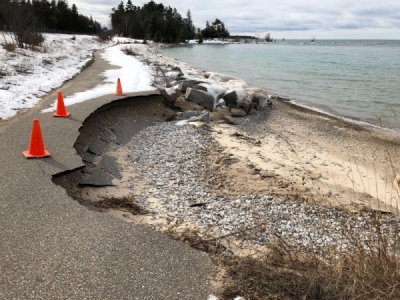
Posted on March 16, 2020
By Paula Gardner | PaulaGardner@mlive.com
Congress will get a chance to weigh a bill that would offer Michigan’s shoreline communities access to $300 million in a low-interest revolving loan fund.
The effort is important, said U.S. Sen. Gary Peters, because rising water levels and coastal erosion in the Great Lakes pose what he called a great threat to many shoreline communities.
“(Forecasts call for) record-high water levels in the coming months which will continue to put roads and homes and businesses and, quite frankly, whole towns at risk of flooding and damage,” Peters said in a media call.
In short, he added: “Coastal communities in Michigan are facing a crisis.”
Peters (D-MI) and Ron Johnson (R-WI), introduced the bipartisan legislation, called Safeguarding Tomorrow through Ongoing Risk Mitigation, or STORM. The Homeland Security and Governmental Affairs Committee unanimously approved the legislation this week. The bill now heads to the full Senate for consideration.
The bill would help any community impacted by shoreline flooding. It’s a national concern, Peters said.
“As climate changes, you’re going to see all of these systemic changes in what we’ll see with more significant weather events,” he said. “We know we have to prepare.”
But it’s of special note in the Great Lakes basin, where ongoing high water threatens to set new records in 2020.
Four of the five Great Lakes set new record monthly water levels in February. Lake Michigan and Lake Huron shattered its February water level record by one-half of a foot. Lake Erie started its seasonal rise in February, adding four inches of water between January and February. Even though Lake Superior declined three inches from January to February 2020, Lake Superior still set a new record water level last month.
Meanwhile, Michigan officials in February estimated hundreds of millions of dollars in long-term repairs to state infrastructure due to erosion damage. That included $100 million for roads, spanning from I-75 near Monroe to the shoreline access road into the Porcupine Mountains in the Upper Peninsula. In between, roads and bridges are under water or facing collapse as waves push the water onto pavement.
Aside from state-owned land and systems, municipalities also face challenges as Great Lakes water levels cause city-owned beaches to disappear. Other damage include water intakes, storm sewer drains, nonmotorized trails and park systems.
Peter said the STORM will would appropriate $100 million over three years, beginning in 2021, bringing it to $300 million that communities could access.
Peters said the loan fund – likely offered at a 1 percent interest rate, though it’s up to rule-making to finalize details – will add efficiency for municipalities “to repair existing damage and plan for future needs.”
He estimated that every dollar spent on preparing for increasing lake levels will save taxpayers $6 in repair costs.
The fund would not be available to individual homeowners on the shoreline, Peters said.
“Every community is different. Some better prepared than others,” Peters said. “They all need resources and don’t have the money to actually put these things in place.”
The bill is supported by the U.S. Chamber of Commerce and several other national municipal advocacy groups.
“The Mississippi River Valley alone sustained over $2 billion in actual losses in 2019 due to just one disaster,” according to the chamber’s letter. “The Great Lakes region has also been experiencing record high water, causing erosion, flooding, and damage to seawalls and roads and placing communities at risk. We must act now on sustainable solutions.”
Source: mlive.com





